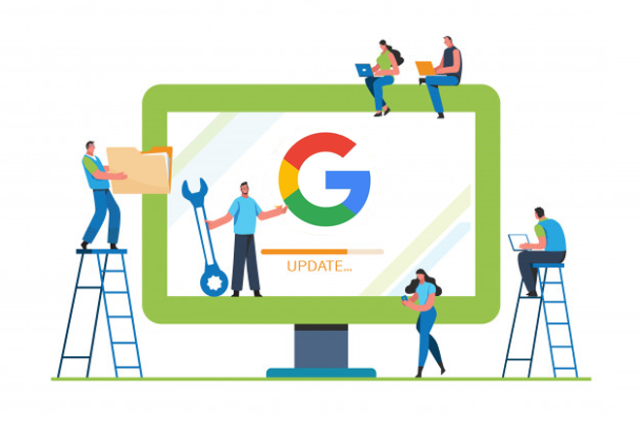Google is the most popular and widely-used search engine due to its advanced search features. Naturally, most websites, publishers, bloggers and other users aim to optimize their website according to Google’s algorithm. This is done to rank higher in the search results of Google SERP. However, the algorithm changes on a periodical basis. Google rolls out minor updates from time to time. Recently, they have released a major Google Core Update in January 2020.
What is a Core Update?
A Core Update is an important update made to the overall search algorithm of the search engines. It is done to provide a better search experience for internet users. Hence, it is responsible for making sure that only relevant information is ranked in the search results. It also makes sure that spam websites and web pages are blocked and ignored.
About Google Core Update
Google’s official Twitter handle for Search Engine @searchliasion had announced that they were going to release a core update for its algorithm. Google Core Update for January 2020 went live on 13th January, on the same day that this announcement was made.
Furthermore, it had stated that it may take up to two weeks to be fully updated in a follow-up tweet. Google announced these core updates beforehand to ensure that publishers, bloggers and content creators can make the changes accordingly. This is done as a core update affects all the websites and not one site in particular.
Google makes sure that the new core update is thoroughly tested before it goes live. An announcement is made as it can greatly affect a site’s ranking causing it to either gain or lose its audience. In hindsight, it aims to improve the overall search engine’s content indexing and assessment.
Recent Changes in Google Core Update January 2020
Here, we have covered all the major changes introduced and implemented in the Google Core Update for January 2020. Additionally, we have also provided tips and tricks to adhere to the same.
Google Search Console Update
With the latest update, Google has introduced a better and more comprehensive reporting for analyzing websites. This will help users to understand how the recent change in algorithm has affected their website and what changes they need to make.
Thus, you can now enjoy a better view of Google feed, a detailed index coverage report and a new updated messaging system. For this, users do not have to make any changes and start using the Search Console right away.
Mobile First Indexing
Google has explicitly stated that they are looking forward to completely switching to Mobile first indexing. Therefore, their crawlers and robots will primarily index content that is available on mobile-friendly websites. Hence, websites who are not mobile-friendly will be indexed later on and thus suffer in search results ranking.
-
How to Optimize your Website for Mobile First Indexing
To combat this recent update, you have to make sure of certain things. Firstly, the mobile version of your website should have the same content as the desktop version. Accordingly, you should ensure that the images are properly placed and do not hide the content.
The search engine optimization should be the same as it is for the desktop version. Additionally, you need to check the placement of ads as well. Another important thing to check is whether the URLs for mobile sites are properly refined for structured data. Hence, the breadcrumbs, video objects and href links should be properly optimized.
Discontinuation of data-vocabulary.org Data Structure
Recently, the schema.org data structure has seen a positive reaction from Google. As a result, they have decided to discontinue and disregard data-vocabulary.org data structure. This has already been started and will be fully implemented by 6th April 2020. Currently, Google will flag your website if you are using the old data structure. This will show up in the Google search Console.
-
How to Prevent being Flagged for Using Outdated Data Structure
By 6th April 2020, you need to use the latest Data Structure from schema.org. Make sure that all your web pages have been updated with the same. This includes the same for mobile URLs if you’re using a separate ‘m-dot’ link.
Implementation of BERT
BERT stands for Bidirectional Encoder Representations from Transformers and is a new addition made to the Google Search Engine. This will allow Google to understand natural human language and to provide search results as close to the term as possible. As a result, it will hugely impact a website’s ranking due to its content.
-
How to Optimize Websites for BERT
According to Google itself, you should make sure that your website is rich in quality content. It should be able to answer a user’s query right away. Hence, you should spend extra time providing quality content that is backed by proper research and sources.
Indexing Secure Websites
Generally, it is widely known that HTTPS websites are indexed much quicker and are preferred by search engines. However, some websites have mixed elements that were both HTTPS and HTTP. Now, Google search engines will slowly disregard mixed websites and stop indexing them. Hence, it will only index those that are strictly HTTPS.
-
How to Prevent having a Mixed Webpage
To ensure that your website is strictly HTTPS, make sure that its elements are HTTPS as well. This includes images, sources, embedded links and even video sources. Google Search Console will help you to find these errors and advise how to rectify them.
Other Ways to Optimize Google Core Update 2020
As stated earlier, the search engine algorithm has been properly refined and tuned to actively answer people’s queries. Hence, here are some legitimate ways to make sure your website ranks higher in the search results.
Content Creation
With the implementation of BERT, Google will now rank rich and valuable content higher in the search results. Therefore, make sure that your content is properly researched and is factual. Do not try to create content that is false or misleading. Now, Google will actively punish those websites who do so. Also, try to provide as much relevant data as you can. You should also update your existing content from time to time.
Keyword Usage
In recent events, Google has been ranking websites that use synonyms instead of only primary keywords. The search engine factors this as relevant and thus ranks the website accordingly. Hence, try to use synonyms and related keywords to the primary keywords. Additionally, avoid stuffing keywords in your content and try to focus more on Long Tail Keywords.
Backlinks Maintenance
To begin with, you should always refrain from buying backlinks. This can be naturally created by providing quality content. Getting backlinks from a third party seller can cause your website to drop in ranking and even be considered spam. Also, make sure that all your backlinks are working and none are irrelevant.
Ad Placements
Oftentimes, a website’s bounce rate is somewhat linked to its ad displays. Now, even Google will penalize those who have a poor ad placement strategy. It is very important to get rid of ‘Above the fold’ ads as they block the content on the page. You should also refrain from adding too many ads. Make sure that the content is the first thing that a user sees when he visits your web page.
Avoid Duplication
Recent strict changes will now affect a website’s ranking if it has duplicate content. Therefore, you should always check and remove any duplicate pages or content from your website. Also, make sure that the content is not duplicated or plagiarized from other websites.
Final Words
Apart from Google Core Update January 2020, some minor changes are being constantly implemented to elevate user experience. Many users have noticed both gains and drops in their online audience due to the recent changes. Therefore, you can follow the points mentioned above to ensure that you keep getting quality traffic by ranking higher.

























